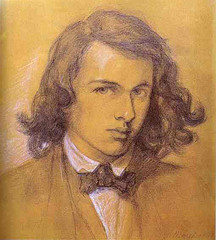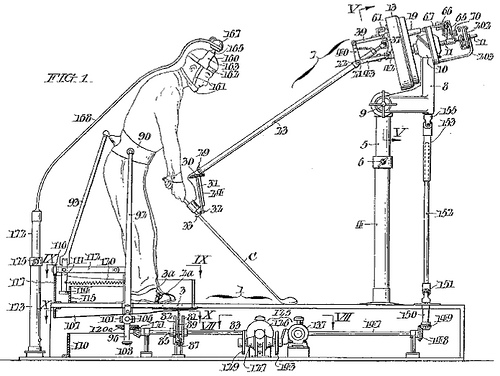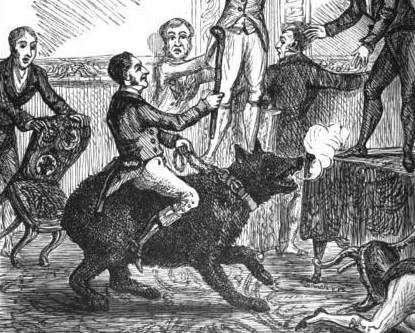
Dante Gabriel Rossetti revered his wife, and when she died in 1862 he laid his journal in her coffin.
Seven years later he decided he needed the poems, so he had her exhumed.

Dante Gabriel Rossetti revered his wife, and when she died in 1862 he laid his journal in her coffin.
Seven years later he decided he needed the poems, so he had her exhumed.
“Not what I have but what I do is my kingdom.” — Thomas Carlyle
On Dec. 9, 1873, something strange happened to Thomas B. Cumpston and his wife in Bristol’s Victoria Hotel. From the London Times of Dec. 11:
They were alarmed at about four o’clock in the morning by terrible noises which they could not explain, and which frightened them very much. The bed seemed to open, and did all sorts of strange things. The floor, too, opened, and they heard voices. They were so terrified that they opened their bed-room window and leapt out. Mrs. Cumpston, also, gave her version of the affair. She said they heard terrible noises at about four o’clock in the morning. The floor seemed to be giving way. It certainly opened, and her husband fell down some distance, and she tried to get him up. What they said was repeated every time they spoke. Being very much frightened she asked her husband to fire off his pistol, which he did, into the ceiling.
The two leapt into the yard and ran to a nearby railway station, where police charged them with disorderly conduct and letting off firearms and released them into the custody of a friend. “No explanation can be given of this strange affair, and the belief is that it was an hallucination on the part of the husband.”

In 1949, George Jenks patented this apparatus “for ultimate attainment of an ideal golf swing.”
G.K. Chesterton wrote, “I regard golf as an expensive way of playing marbles.”
Croesus asked the oracle at Delphi whether he should attack the Persians. She replied that if he went to war, he would destroy a great empire.
Croesus attacked, but the Persians beat him back, invaded his kingdom, and threw him into chains. He sent another message to the oracle: “Why did you deceive me?”
She replied that she had not deceived him — he had indeed destroyed a great empire.
One Theodore Reinking, lamenting the diminished glory of his race, wrote a book entitled Dania ad exteros de perfidia Suecorum (1644). It was not a very excellent work, neither was its author a learned or accurate historian, but it aroused the anger of the Swedes, who cast Reinking into prison. There he remained many years, when at length he was offered his freedom on the condition that he should either lose his head or eat his book. Our author preferred the latter alternative, and with admirable cleverness devoured his book when he had converted it into a sauce. For his own sake we trust his work was not a ponderous or bulky volume.
— P.H. Ditchfield, Books Fatal to Their Authors, 1895

The Mona Lisa has no eyebrows.
As I was passing near the jail
I met a man, but hurried by.
His face was ghastly, grimly pale.
He had a gun. I wondered why
He had. A gun? I wondered … why,
His face was ghastly! Grimly pale,
I met a man, but hurried by,
As I was passing near the jail.
— J.A. Lindon
Two women are selling apples. The first sells 30 apples at 2 for $1, earning $15. The second sells 30 apples at 3 for $1, earning $10. So between them they’ve sold 60 apples for $25.
The next day they set the same goal but work together. They sell 60 apples at 5 for $2, but they’re puzzled to find that they’ve made only $24.
What became of the other dollar?

Some of us just aren’t cut out for the gentry. Shropshire squire John Mytton hunted naked, rode a horse through the Bedford Hotel, fed his dogs on steak and champagne, overturned gigs, pelted babies with oranges, inebriated his horse, and tried to cure hiccups by setting his shirt on fire. He died in debtor’s prison in 1834.
A biographer notes drily that Mytton once rode a bear into his drawing room in full hunting costume. “The bear carried him very quietly for a time; but on being pricked by the spur he bit his rider through the calf of his leg.”